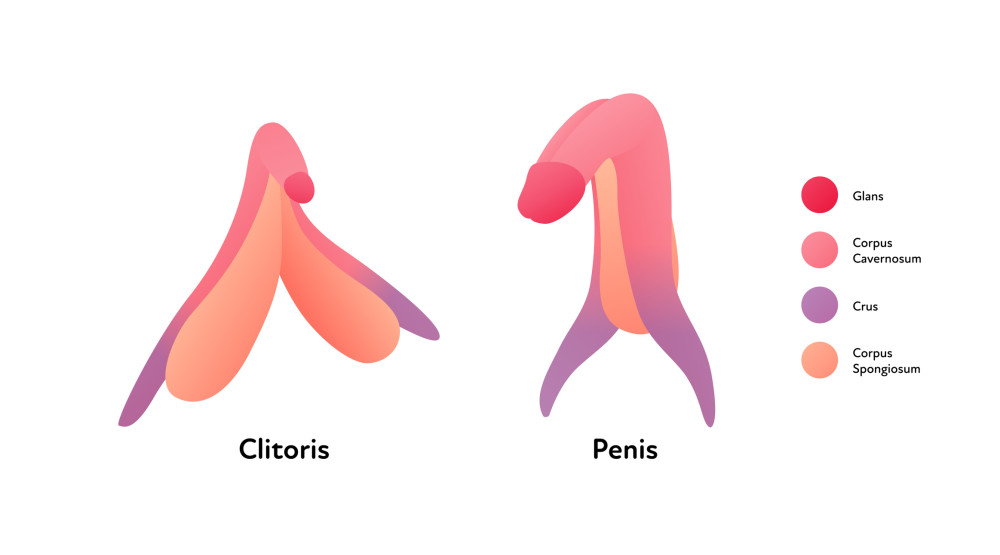As sex is sometimes still a taboo topic, the information cursating around it is.. well, let’s just say, there are blank spaces, and people don’t always fill them right. There’s a lot of myths around sex, pleasure, masturbation and contraception. Here’s 8 popular ones, but debunked.
#1: The hymen breaks when having sex for the first time.
❌ False!
To this day, the hymen (or lack thereof) is sometimes still seen as a reliable way of checking if a woman is a virgin or not. The myth goes so far that in some cultures, where sex before marriage is not accepted, this is the criterion of pureness. There’s even surgeries to restore a broken hymen and save your reputation and honour.
Crazy to think that all of that is based on a myth, but it’s the truth! Hymen are extremely individual. They vary in size, shape and, contrary to common belief, they are not a piece of skin covering the whole vaginal channel. In rare cases where this is true, no period blood or vaginal discharge can leave the body, which is a medical emergency and requires surgery. You can imagine it as more of a ring, a small membrane that is actually quite elastic.
There are several ways how a hymen - if you even have one - could break, and there doesn’t have to be any blood involved. Some do notice it tearing during sex (but it doesn’t have to be the first time, could be the fifth time for all we know), and some don’t even notice it at all. It could also happen during exercise, stretching, or by inserting a tampon. If you notice any discomfort during your first time, it might just be because you’re nervous, lacking lubrication or cramping up.
#2: A penis can shrink over time.
✅ True!
There’s actually many reasons why, but it’s generally very likely that your penis will definitely shrink in size over time. This may be due to…
- Age: As you get older, your penis and testicles may get smaller, as blood flow can be restricted from deposits in blood vessels.
- Smoking: Again, if your blood vessels are damaged in any way, this can prevent the penis from filling with blood and stretching. And smoking will do that! It can also cause erectile dysfunction, but that’s a whole other thing.
- Medical issues: Research has shown that for example prostate surgeries can make the penis decrease in size, and there’s certain conditions like Peyronie’s disease that can also cause this.
#3: You can’t get pregnant when you’re on your period.
❌ False!
I hate to break it to you, but you can become pregnant anytime when having cis-hetero-penetrative-penis-in-vagina-sex. It’s true that it’s less likely when you’re on your period, but nevertheless not completely impossible.
First of all, not everyone has a regular cycle and any changes in you or your surroundings can mess with your cycle, so relying on it 100% isn’t the safest way to go. If you’d like to do it the natural way, tracking your cycle is a good place to start, but it’s not enough. To be certain where exactly you are in your cycle, tracking your basal body temperature is necessary. It’s an alternative contraceptive method that is safe, but prone to a lot of mistakes, so it’s better to do a lot of research on it rather than just jumping in.
Another thing is: Bleeding doesn’t always have to be caused by a period. There’s many reasons why a woman could have intermenstrual bleeding, like changes in hormone levels, inflammation or infections, or even IUD use. So, taking vaginal bleeding as a free pass to have unprotected sex: not the best idea.
#4: Pulling out is a reliable form of contraception.
❌ No. Just no.
Yes, there’s a reduced probability. If you throw 500 balls, chances are higher one is gonna hit the net. But chances are not 0 when you only throw 5 - especially if your guy’s a good thrower. It’s maths.
What I’m trying to say is: Next to the ejaculation as you know it (you know, right at the end), there’s something called precum. It can be released any time during sexual arousal, and you can’t control it; in fact you will probably not even notice it. And can it get you pregnant? Hell yes.
Precum in its purest form doesn't actually contain any sperm cells. It is made up of enzymes and mucus, and its purpose is simply to prepare the urethra for ejaculation by ridding it of any acid left from urine, as this can affect sperm motility and vaginal health. In addition, it provides lubrication, which is always a good thing with sex.
The problem is that, as you might guess, if everything goes through one tube, there can be contamination. Meaning, residual sperm can mix with precum and carry semen through the urethra before ejaculation. There’s no possible way to know whether your precum contains sperm in this moment or not - unless you want to pull out a microscope, take a sample, and THEN get going, but that seems a bit complicated and might not help the mood. So, better be safe than sorry!
#5: Sperm cells can survive up to 5 days inside the vagina.
✅ True!
Outside of the body, sperm cells can only survive for a short amount of time, probably not longer than 30 minutes. But inside a vagina, the conditions are ideal for the sperm to stay alive for several days! If you track your cycle as a contraceptive method, this is something you should definitely keep in mind. Fertilization of the egg is therefore still possible several days after having sex.
#6: There’s vaginal and clitoral orgasms.
❌ False!


This myth is rooted in a long string of false information regarding one of my favourite organs: the clitoris. If you think the clitoris is just a tiny knob, you would be incorrect. But I don’t blame you - after all, that is what was being taught almost everywhere until very recently (or even still).
Being the only organ whose sole purpose is to provide pleasure, the clitoris is roughly the same size as an average penis. There’s a lot going on under the surface with this one: next to the clitoral glans and hood (the part you can see from the outside), there’s a whole body attached - legs and all! This part is internal and is of course not isolated from other parts of the genitalia. The so-called “bulbs” are located in a way where they are tangent to the labia, the urethra, vaginal canal and even the anus.
The vaginal canal itself is not very sensitive, as it doesn’t hold many nerve endings, and is only really susceptible to pressure. Can you imagine how crucially painful giving birth would be if the vagina was made up of 8,000 nerves like the clitoris? Personally, I think the problem of overpopulation would be solved. The only way to climax during penetration is therefore, again, through the pressure on the clitoris that surrounds the vaginal canal.
#7: Plan B is a safe bet.
❌False!
Condom ripped? A stomach flu? Antibiotics in the system?
There’s many reasons why contraceptive methods might fail, and the “morning after pill” is often seen as a last resort. Anyone who has already taken it might (or might also not, let’s be honest, the information given on contraception even from medical professionals is more often than not quite sparse) be aware, though, that Plan B does not work unconditionally.
To estimate whether Plan B is going to be effective or not, it’s helpful to know where you are in your cycle. The way the morning after pill works is by delaying or preventing ovulation, the process in which a mature egg is released by the ovary into the uterus. The difference to an abortion is that, in this case, the egg hasn’t been fertilized just yet, so a pregnancy is (if successful) prevented, and not terminated.
As you may have already guessed, if you’re past ovulation and the egg has already been released and fertilized, the emergency contraception will not be successful. Of course, there can be uncertainty as to whether you’ve ovulated or not, so if there is any chance you haven’t yet, you could and should definitely try your luck, but maybe still buy a pregnancy test in advance just to be sure.
#8: You should pee after having sex.
✅ True!
It is highly recommended to pee within 30 minutes of having sex, especially for women. This is because, during sex, bacteria can enter the urethra and cause infections. The urethra of people with vulvas is shorter, so a urinary tract infection (UTI) is more common. UTIs can be extremely painful (and annoying as hell), so to try to prevent this it’s a good idea to flush out the germs by peeing.
Go piss girl!
Could we clear some things up for you? Or are you still confused about some stuff? Tell us myths about sex you've heard that you're still wondering about today in the forum!
JOYclub: What is that?


- With over 5 million members, JOYclub is a lively, sex-positive community that will turn your love life completely upside down.
- Whether you're male, female, trans, single or a couple, JOYclub is the place to discover and live out your erotic fantasies with other members (with your partner, if you like).
- Curious? Then register for free and without obligation and discover the fascinating JOYclub world. We are looking forward to meeting you!




